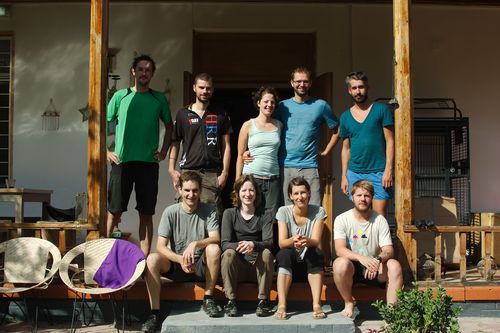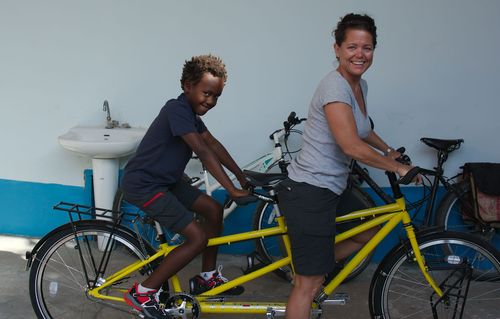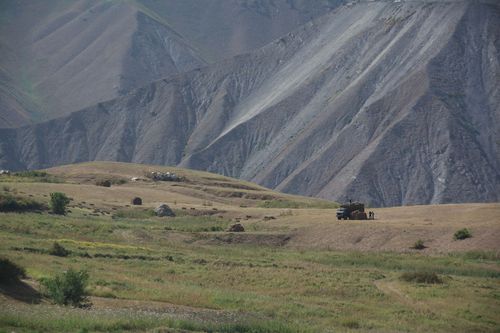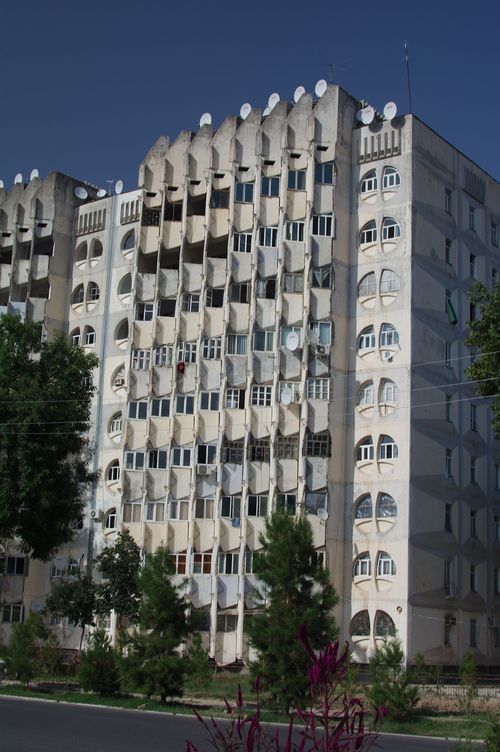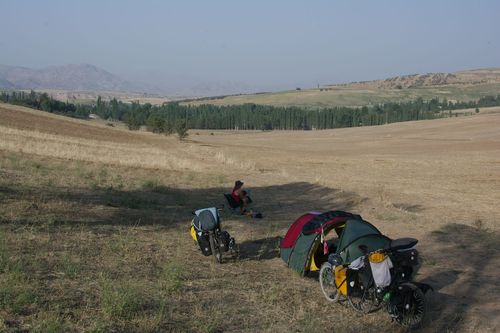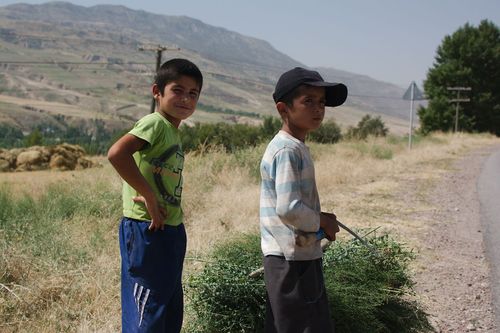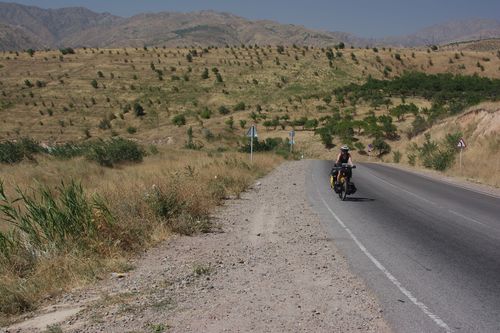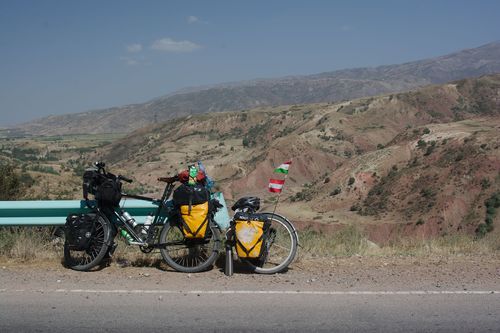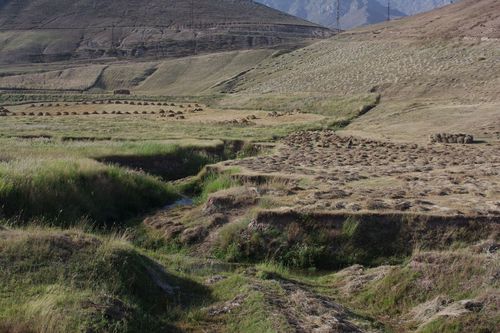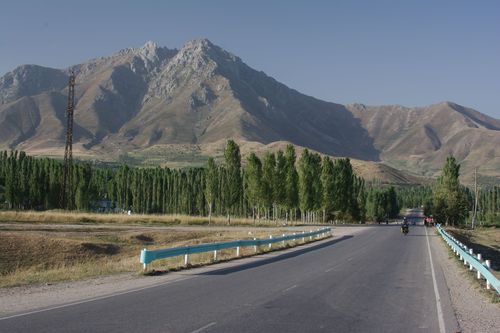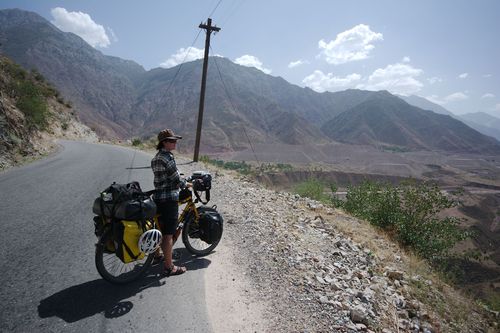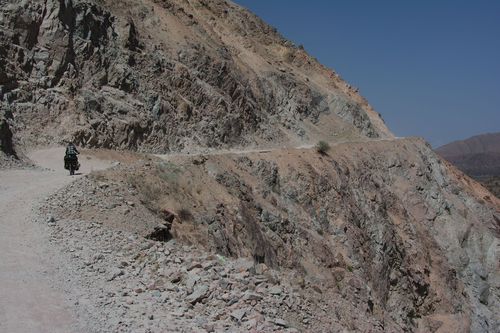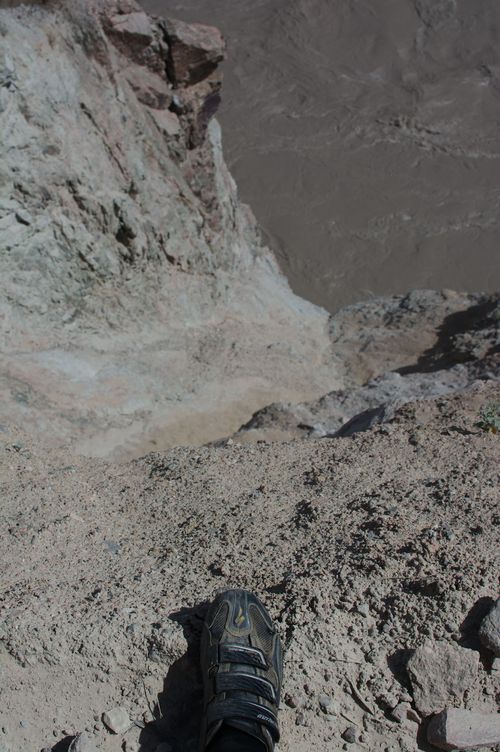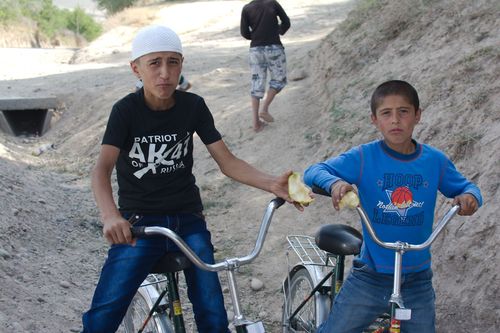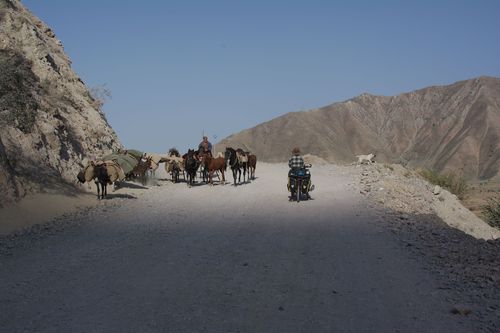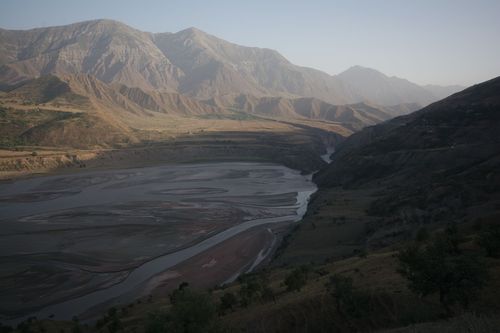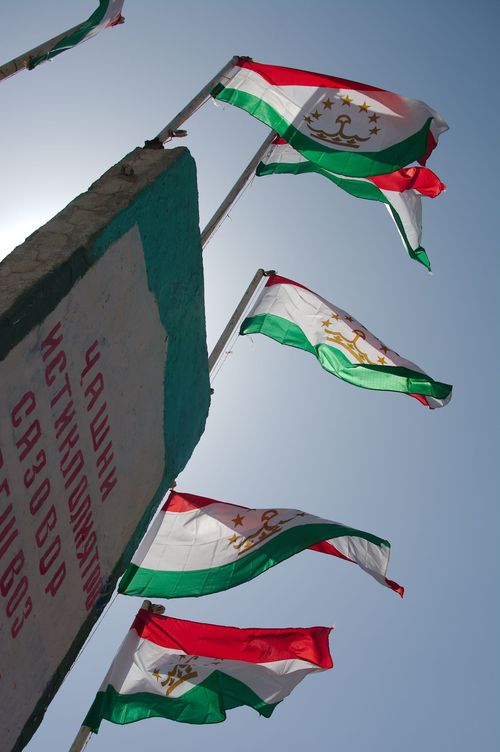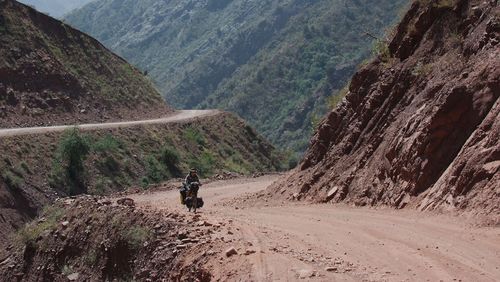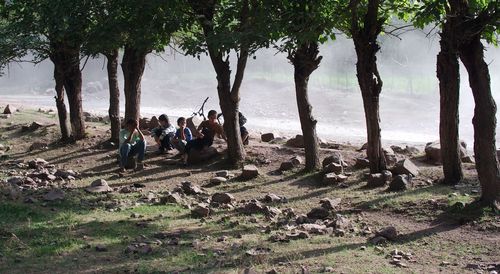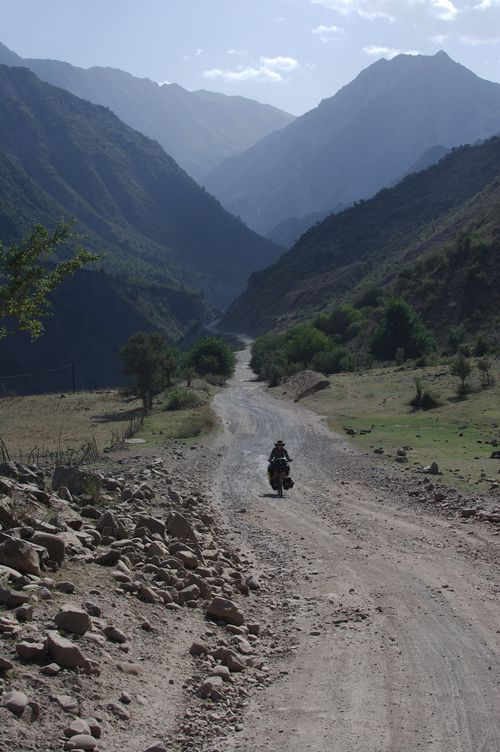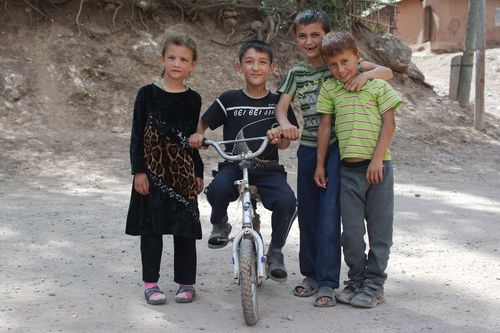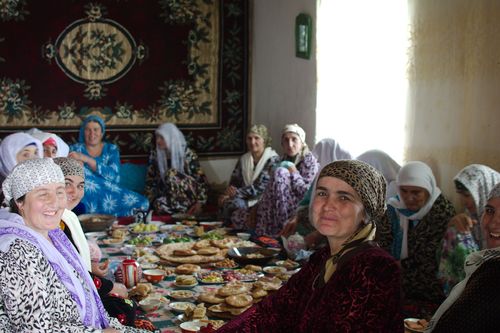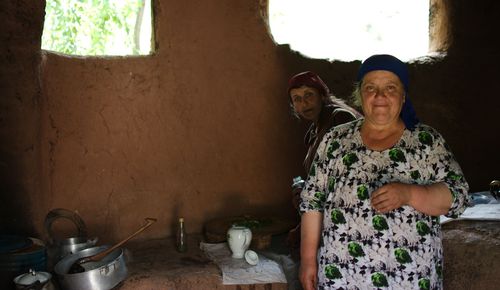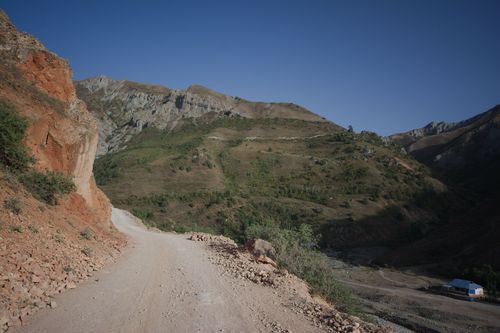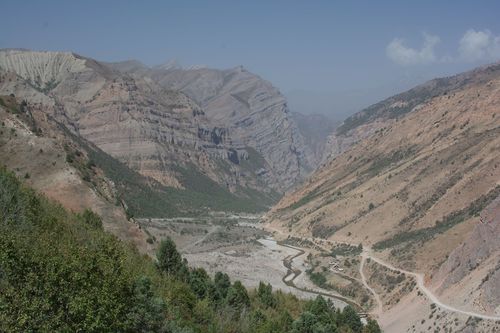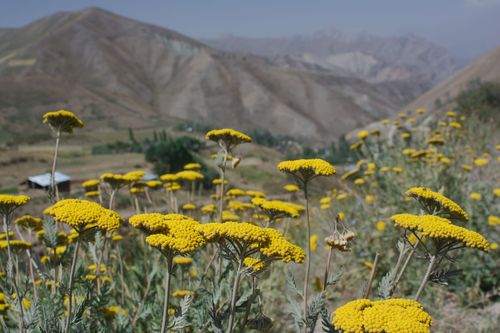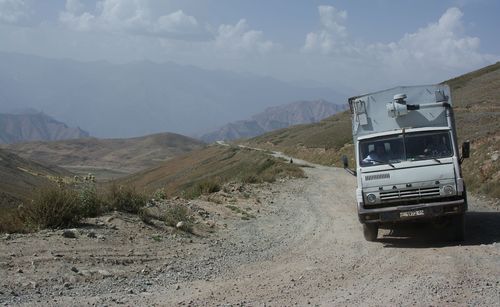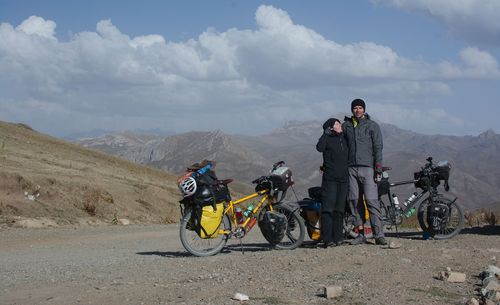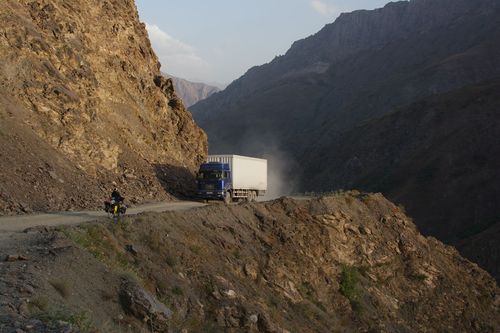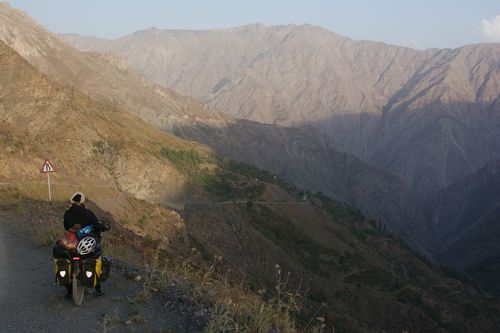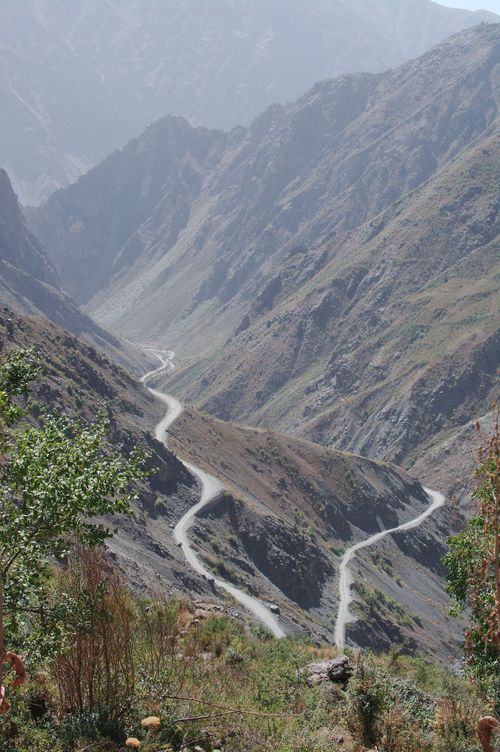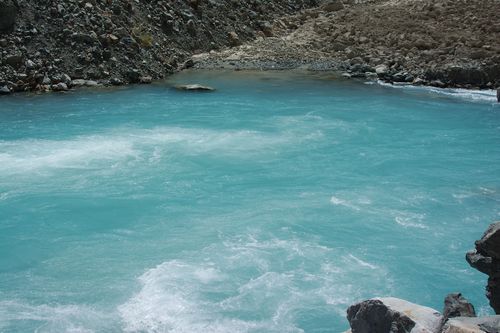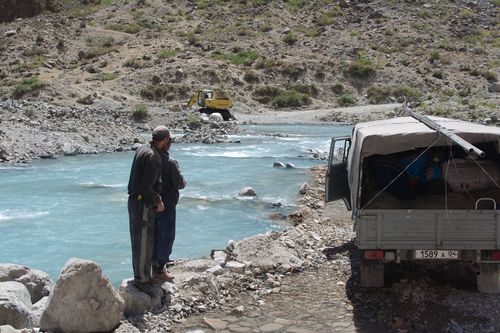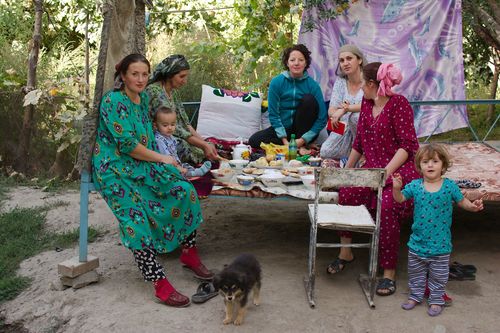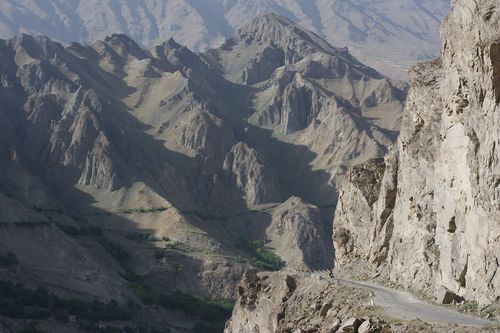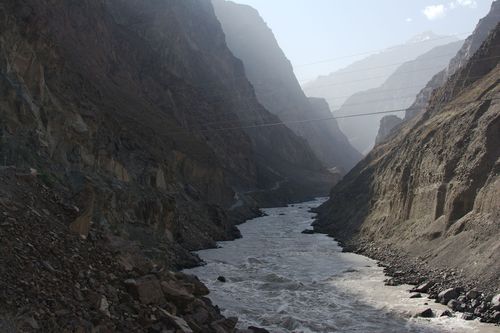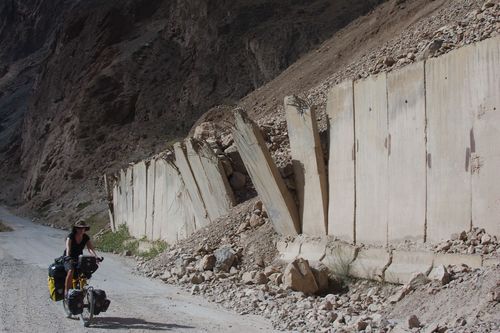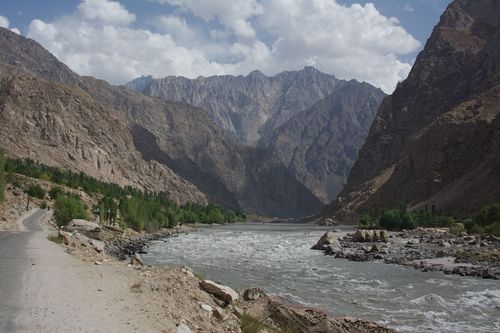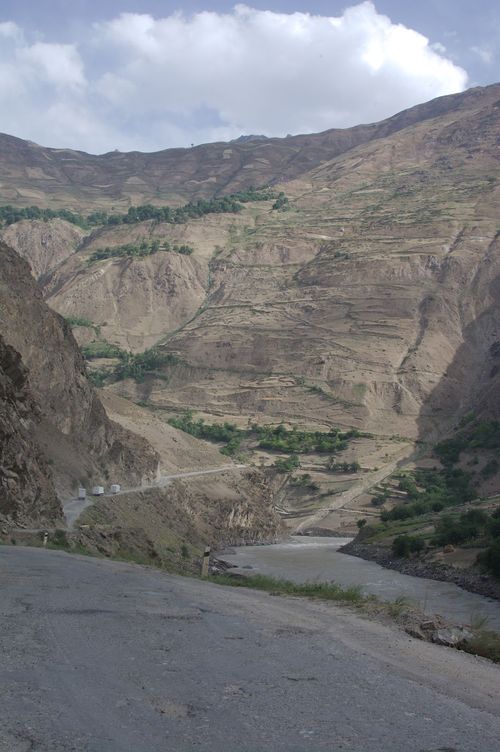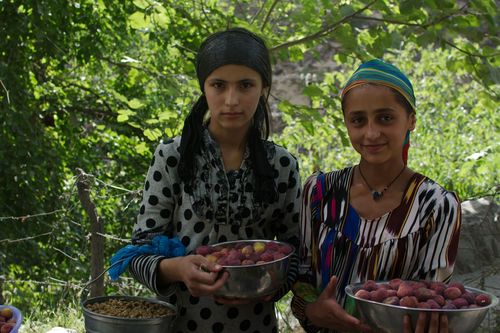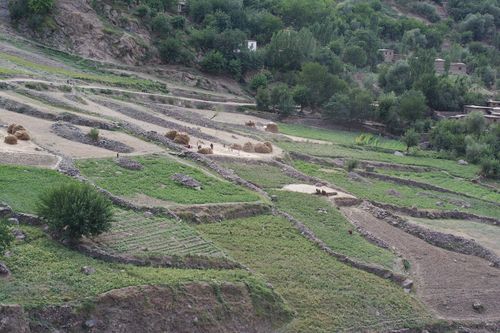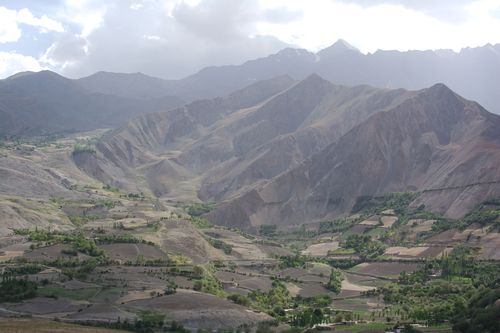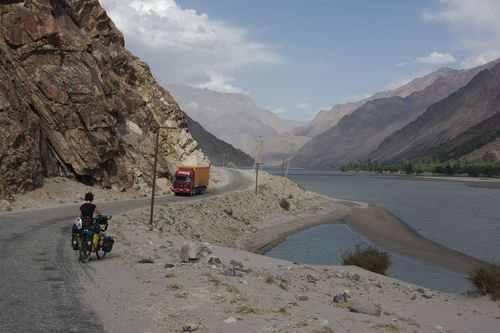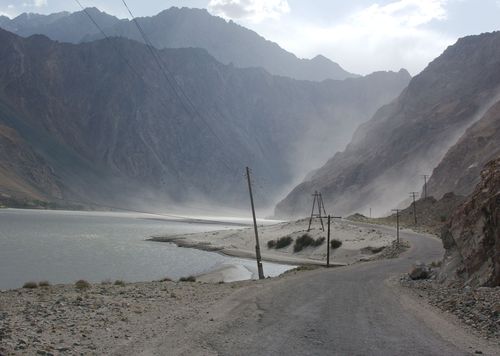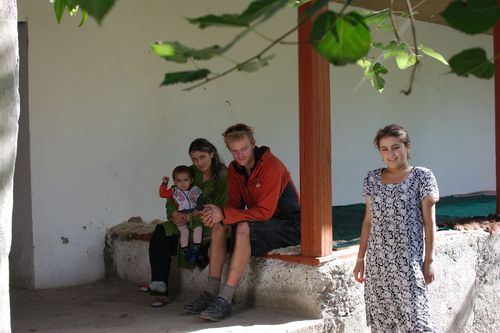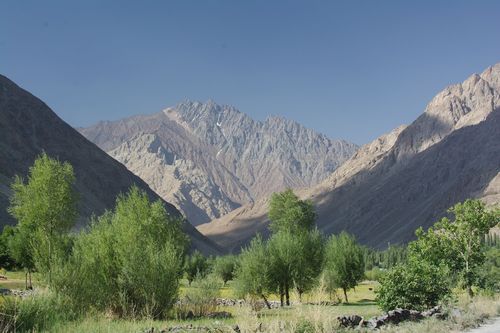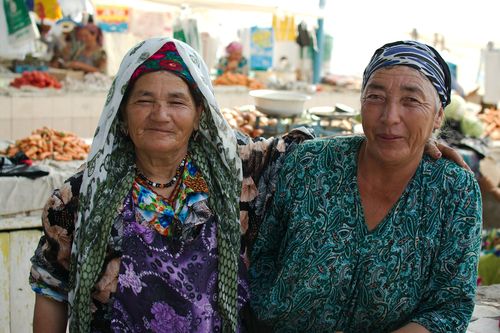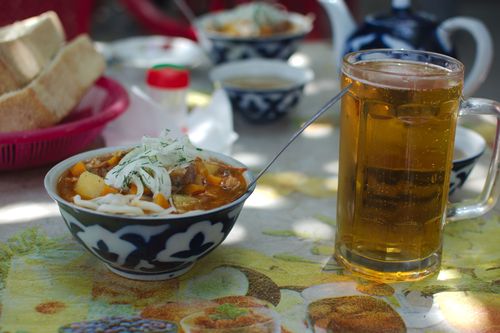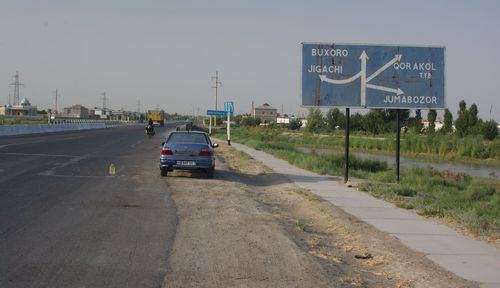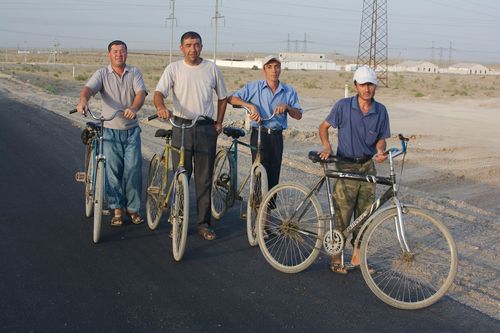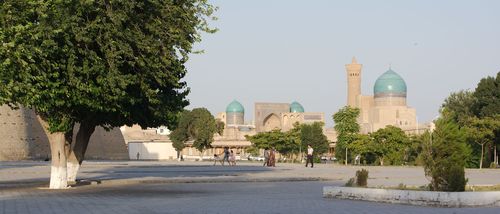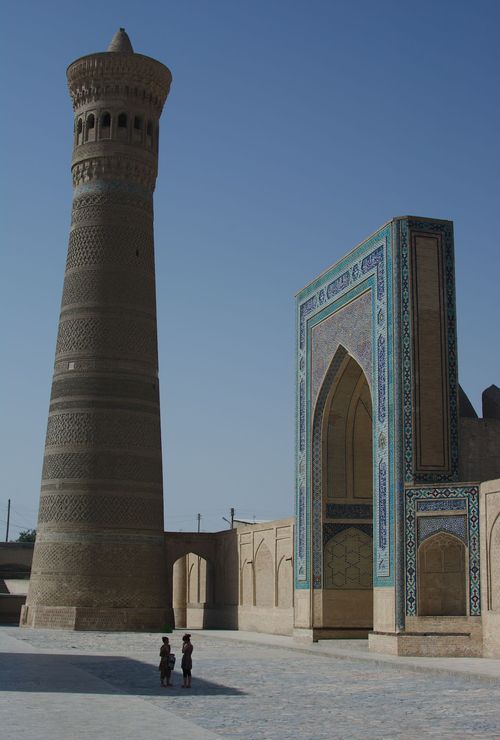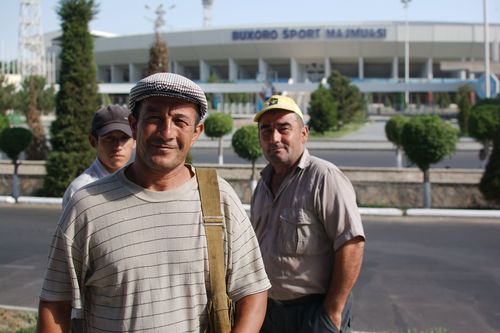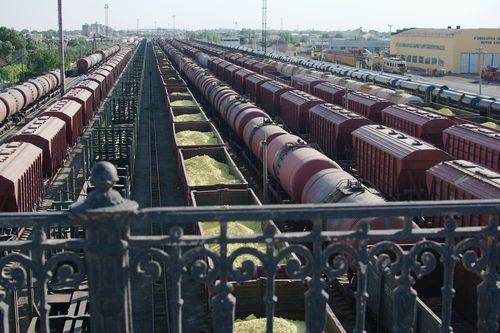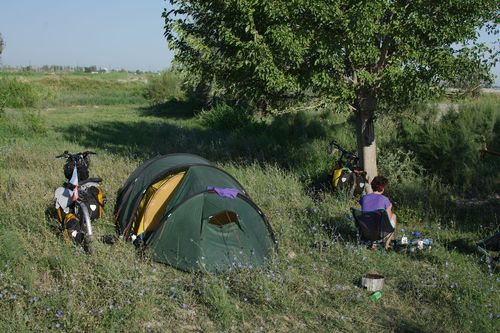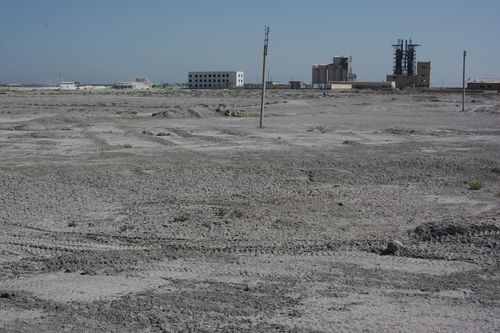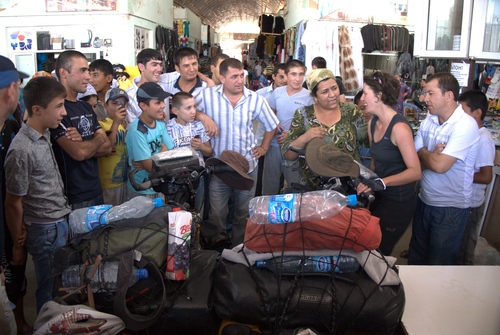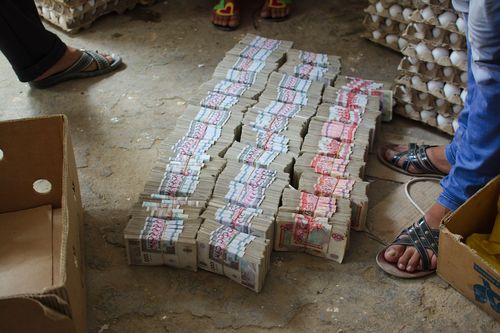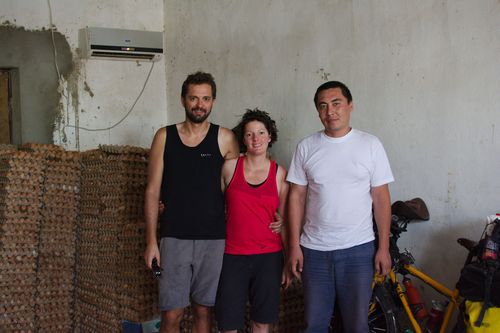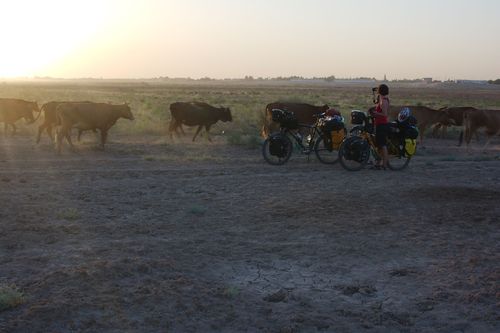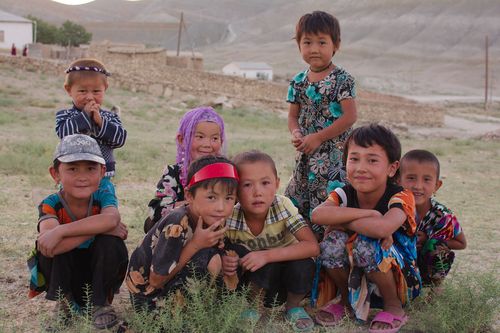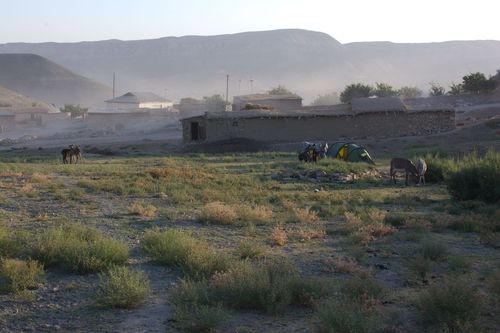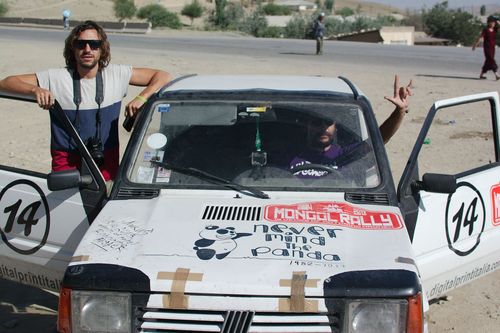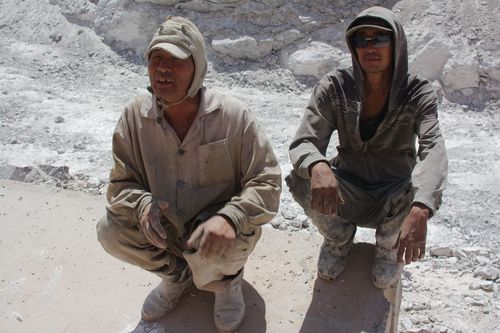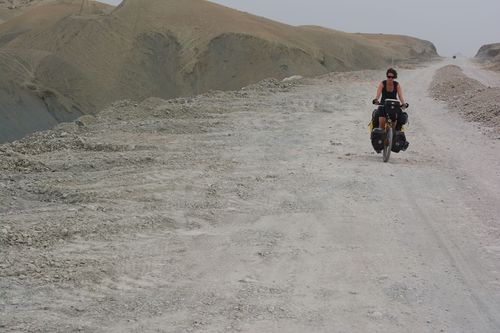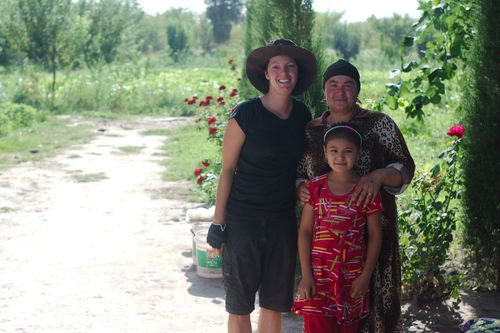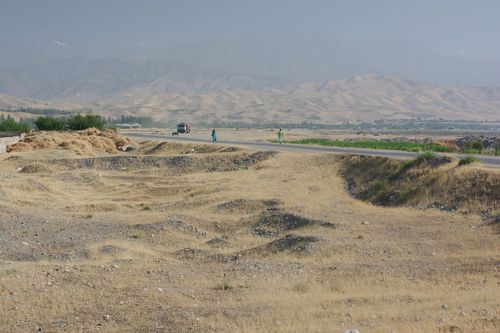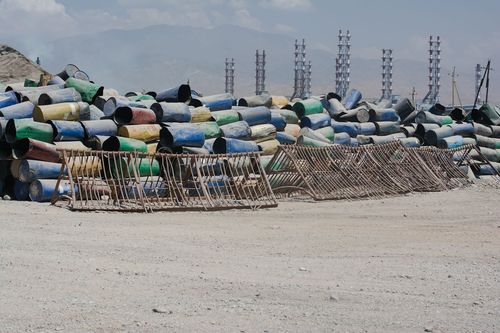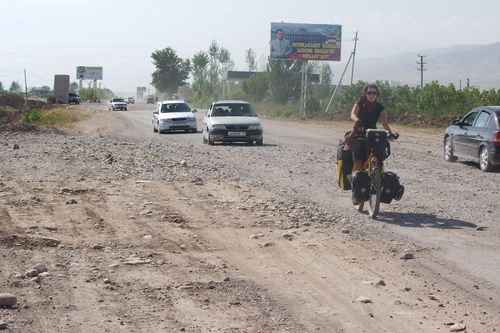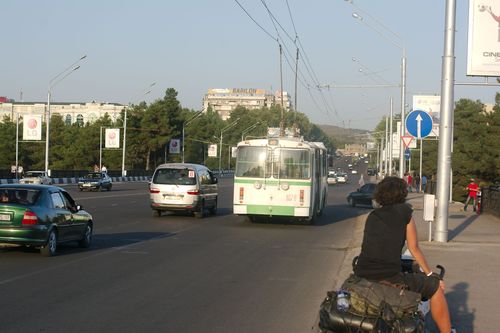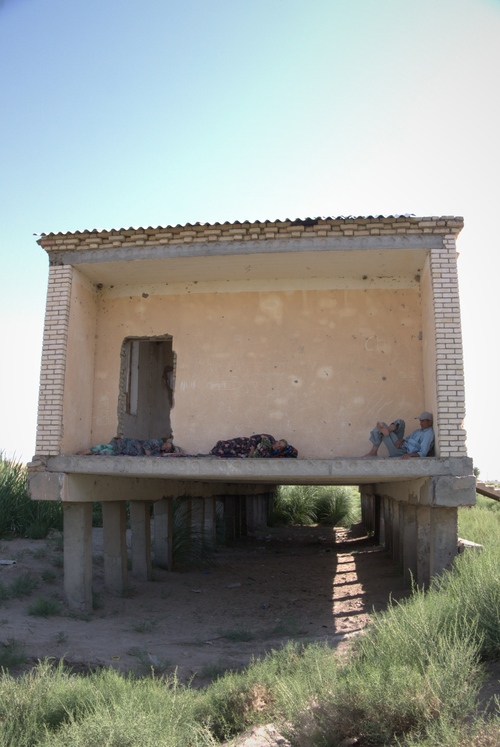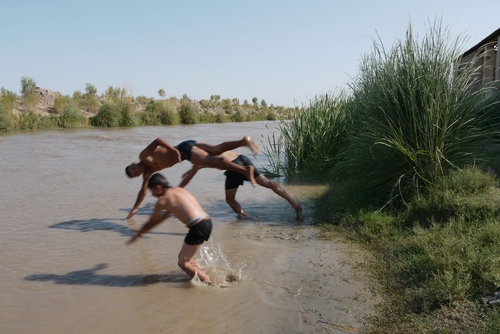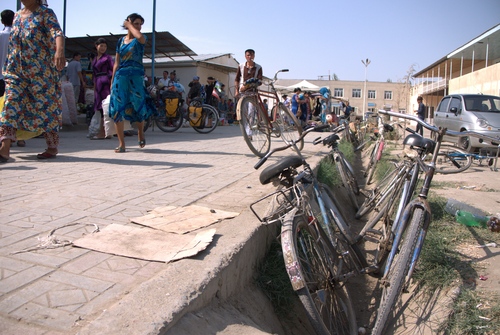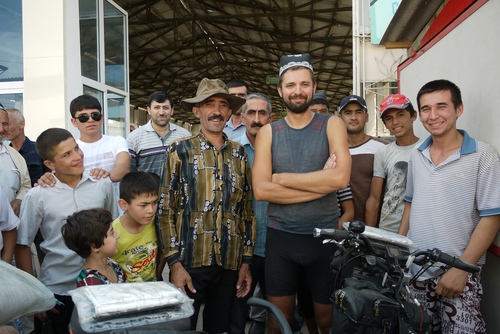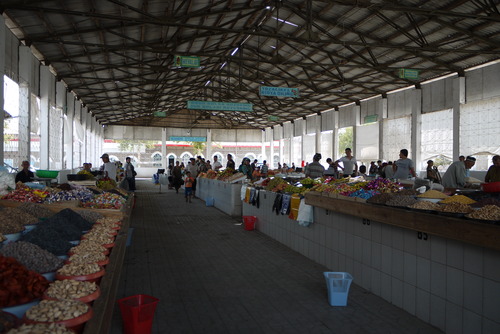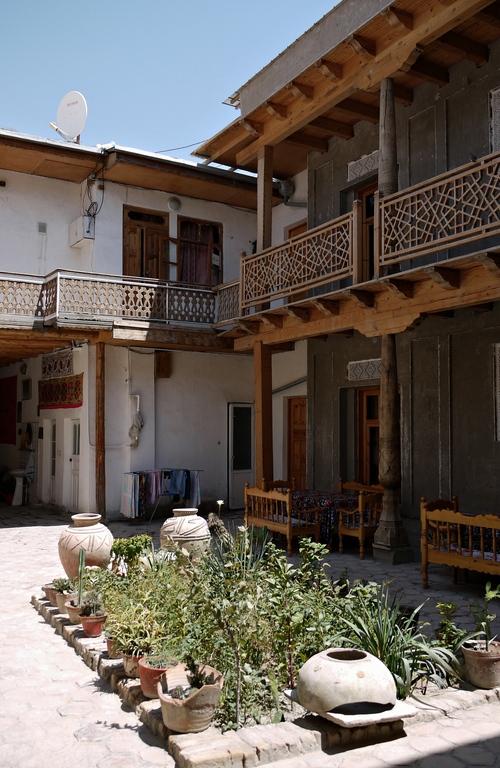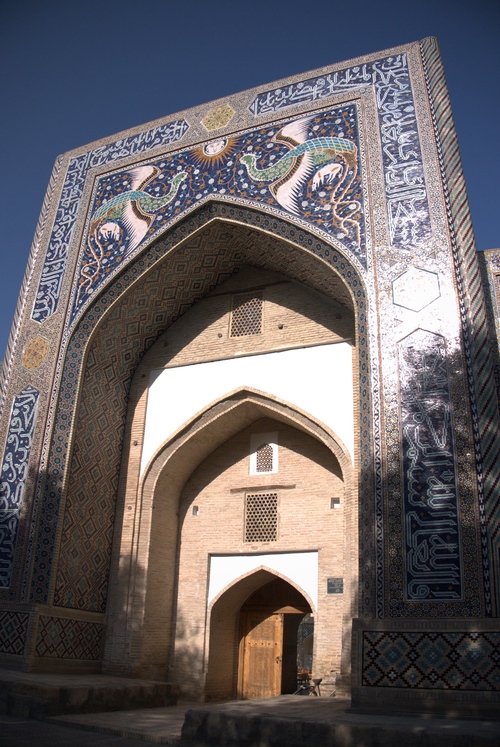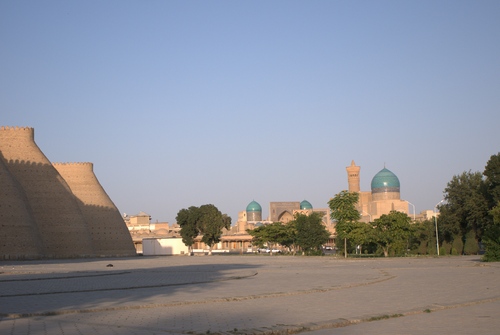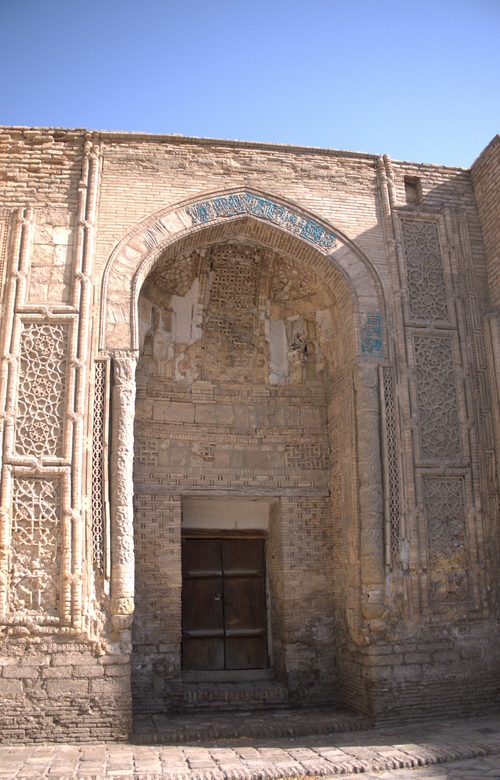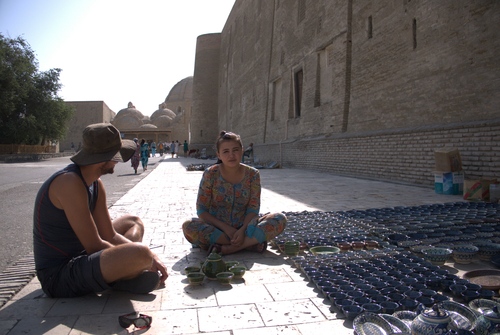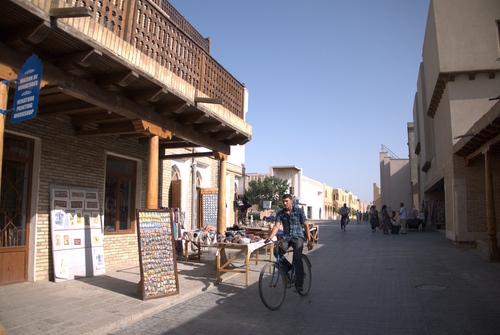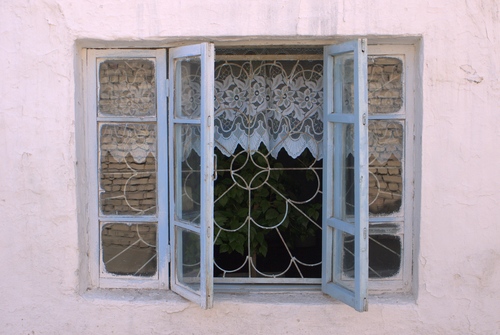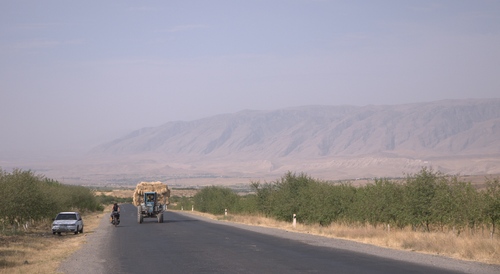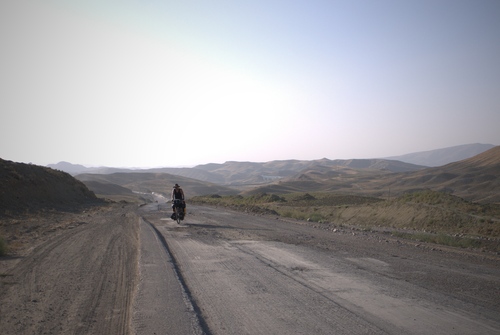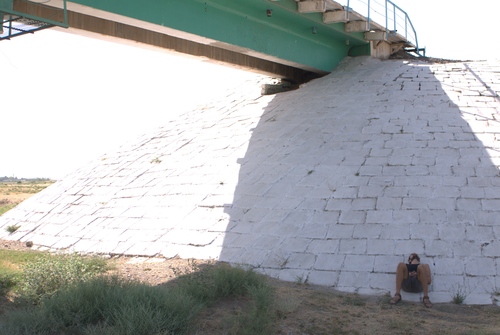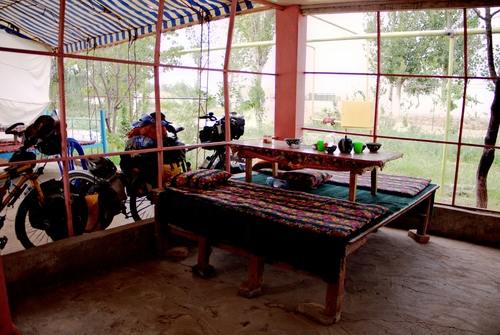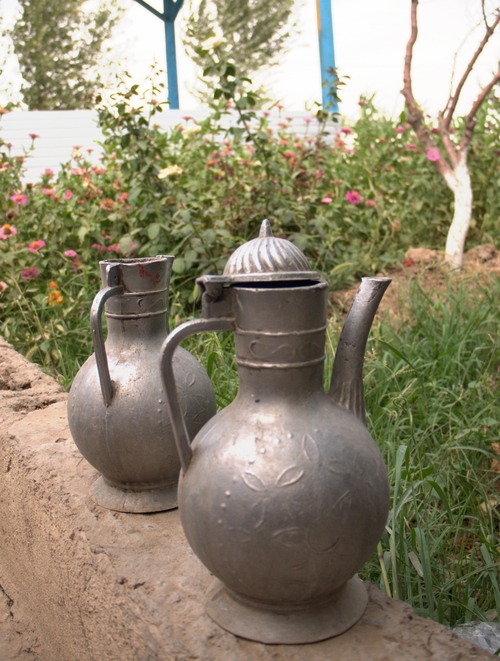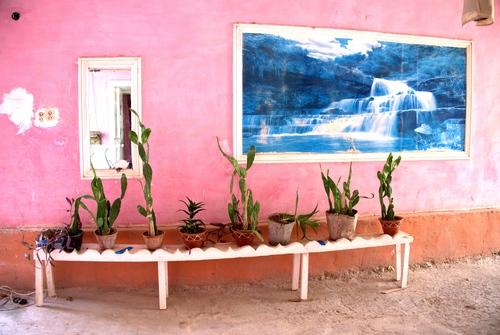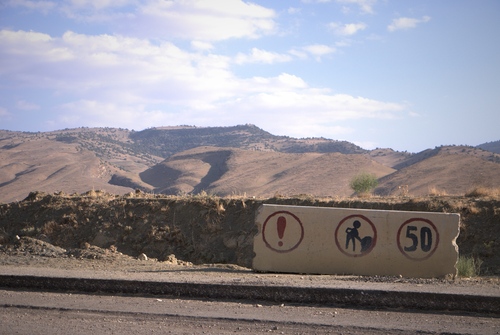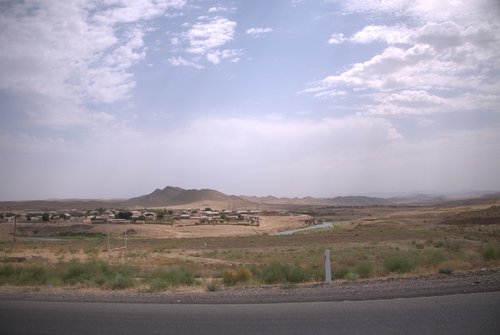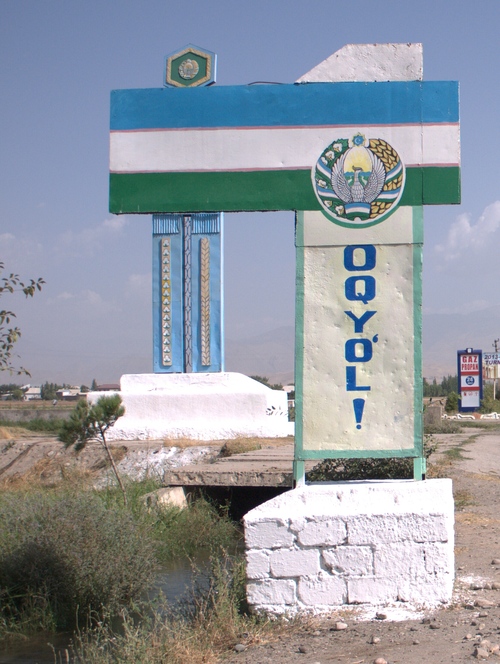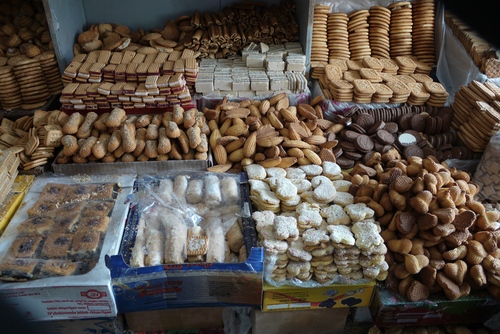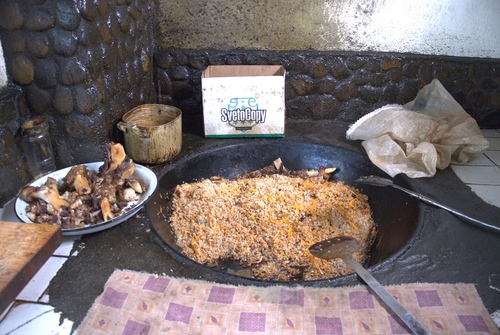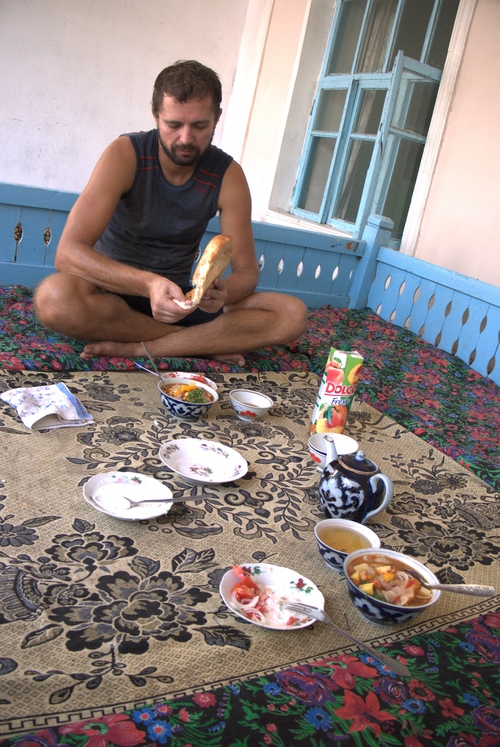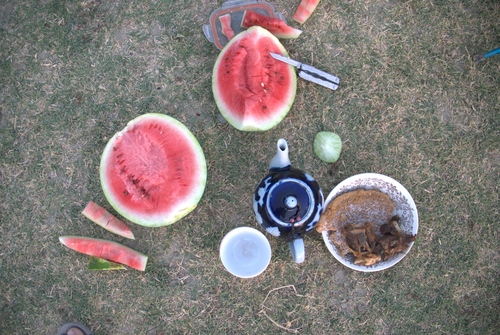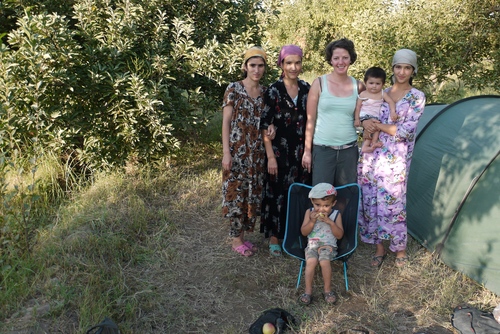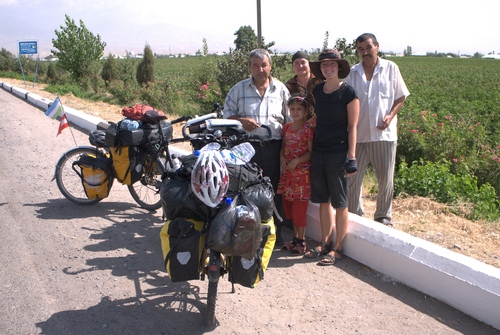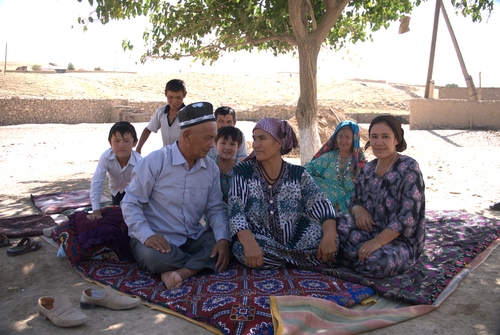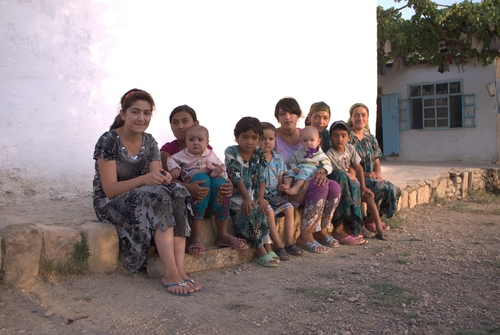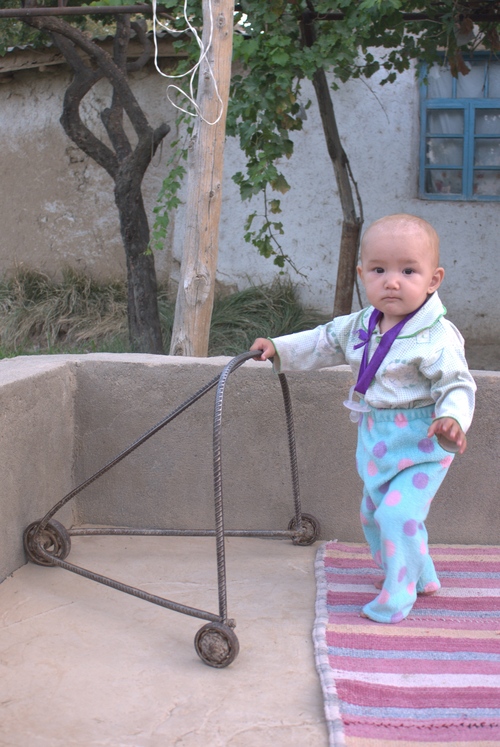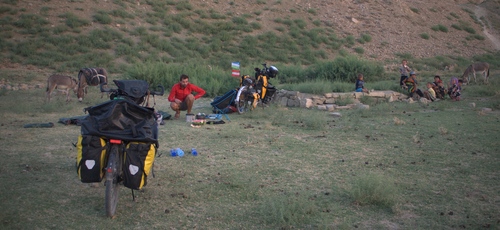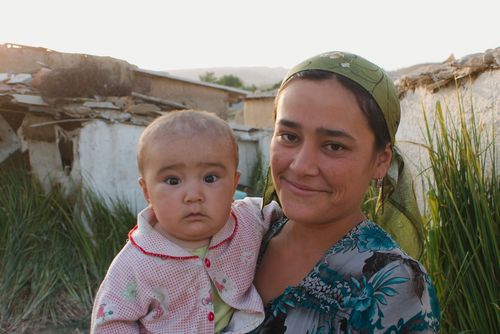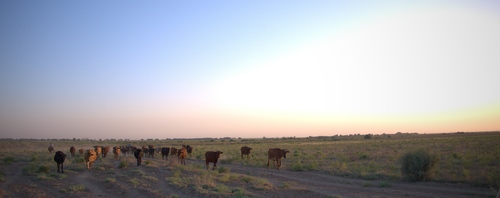Along rocky river banks
distance: 685.24km
duration: 120h 47min
Véronique is probably one of the most active warmshowers.org-hosts in the world. We where 9 cyclists residing in her house in the north of Dushanbe - and we where only one of the many groups that stayed with her throughout the summer. With us where Paul Lombard, cycling from Korea back home to England, Ria and Oliver, who we where in contact with since April(They nearly stayed in our flat in Vienna), Micha and Gergana on a world tour as well and a few days later Luke and Tom arrived, on their way to Bangladesh.
It was a great opportunity to exchange travel stories and information and Véronique and her son Gabriel where most sympathetic hosts.
Daniela and I had arrived first, but we also left as the last of the group, as we where waiting for a parcel from my parents with all our winter gear(Sleeping bags and clothing). Unfortunately, it didn't arrive and after 10 days in Dushanbe we decided it was time to move on, with the hope our stuff would arrive eventually and catch us later on the road.
Lo and behold, 2 days after we had left, Véronique called us with good news, she had information that the parcel was in Dushanbe! She would make sure we get it to Khorog(The next larger town on our route), as soon as she had the parcel in her hands.
The first day out of Dushanbe was mostly flat through green farm land, but soon after that the climbs start. There's a drastic change of the landscape after Obigarm, where the road plunges down to the Vakhsh River. From there on it's a constant up and down, mostly on dusty gravel road.
At Komsomalabad the road splits - the northern fork leads directly to Sary Tash/Kyrgyzstan(Eleanor Moseman rode this route in 2012), the southern fork will bring you to Khorog and Afghanistan - and for us it marked the proper beginning of the Pamir Highway, as shortly after the fork on the southern branch the hard part of the cycling started.
After 2 days of riding along the floor of the narrow, rocky valley in dusty heat, it was a welcome change to climb up the slopes of Khaburabot Pass to 3252m. Refreshing green meadows and finally the opportunity to see farther than the next river bend.
The downhill from the pass went through a spectacular gorge, and late as we where, we set up camp halfway down.
The next day, at the end of the downhill, we encountered a broken bridge, which we already had heard rumours of back in Dushanbe of beeing impassable(This claim later repeated by a passing driver).
The bridge was gone, but at the nearby ford the ice-cold water just reached to our knees, so it was far from beeing unpassable. We where already set up and eager for the adventure of crossing by foot, having unloaded the heavy bags and barefoot i started carrying the bags towards the water.
But then a jeep arrived on the scene and offered to take us. A moment later we where on the other side of the ford with dry feet, bikes and bags with us.
In hindsight i regretted the rather quick decision to take the jeep - crossing the river by foot would have been a fine memory!
At Kalaikhum, a few kilometers down from the broken bridge, two roads from Dushanbe converge and it's where we meet the Afghan border and the Panj river, both of which we will follow 240km to Khorog.
The environment is back to what it was before the pass - a dry, narrow and rocky valley, the view obstructed by the next bend of the river, a few snowy peaks high above us, out of sight unless you look way up.
It is adventurous cycling - the road twists and turns, rises high above the river and then plunges down again close to it's shore. Some segments of the gravel road are in awful condition, often when a nearby scree pushes material over the track, which either destroys the surface or covers it entirely(And the road is built anew on top of it, which leads to an especially rocky track).
On the other side of the river we see Afghans in traditional clothing threshing wheat by hand, children walking home from school on the narrow path that has been cut into the rock, kilometers from the next village, Afghan clay-houses, without windows but a satellite dish on the flat roof. Women wearing wide skirts and covering their hair with a scarf(No Burkha), men in the Shalwar Kameez and the Pakol, the traditional woolen flat hat with a thick rolled-up edge(Both of which we would later see in abundance in Pakistan).
The afghan villages are green oases in the brown-grey monotony of the valley, with neatly stacked terraces for crop and vegetables, the houses embedded within poplar trees to protect against wind and weather. Very idyllic - but also quite obviously very poor.
After 3 days of steady but unhurried cycling we decide we have to get out of the narrow valley and the monotonous ride - we start to feel locked in and are bored by the endless up and down and the tough road. Getting up earlier and riding harder, we reach Khorog on the 10th day after leaving Dushanbe, on the last 60 kilometers we have smooth tarmac, which feels like flying!
As suggested by many, we stay in the Pamir Lodge - a very simple hostel with gloomy, cold rooms furnished with cheap foam matresses, a outhouse and a single semi-hot shower(We later learned that there's a nice homestay in Khorog).
On the second day we receive a most welcome visit by a local taxi driver - Véronique has managed to get our parcel with winter gear from Dushanbe to Khorog via a 4x4 taxi - a 12h ride. There was even contemplation to deliver it by helicopter, but unfortunately the parcel was too large for the aircraft.
Up to Khorog it was still very warm, as we had barely risen above 2000m - with our subsequent climb to the high plateau of the Pamir that was apt to change soon. Without our down winter sleeping bags and warmer clothes this endeavour would have been impossible.
Khorog also brought a reunion with Ria and Oliver, Daniel(Who we have previously stumbled into in Tabriz/Iran and Buchara/Uzbekistan) and we meet Alex from England(Who rides with Daniel since Samarkand) and Christian and Yvonne from Switzerland.
The outhouse, which is an uncomfortable walk of 50m from the rooms, is well visited during while we are there, most of the cyclists get sick in the few days we stay in Khorog.
Eventually though we all get better and one group after the other leave towards the Pamir Plateau. This time, Daniela and I are the first one's to leave for a change.
On the ropes in Uzbekistan
distance: 714.47km
duration: 144h 56min
At first I thought I had catched a cold from the air condition - sore throat, pain in my joints, fatigue. However, at some point in the night I had to get up to pay the toilet a visit as I could no longer bear the pressure in my colon, which had woken me up.
We had arrived in Bukhara two days ago and found a hostel in the center, pricey but a "western" flush toilet en suite.
When I sat on the pot, explosively releasing diarrhea, I also had a sudden and inescapable urge to throw up. Luckily we had done the dishes earlier and our camping pot was still in the bathroom within arm's reach. Sitting there, liquid matter spraying both from my rear and front end, it was clear that this was a lot worse than just a common cold.
After I had spent the next 3 days in the hostel bed, eating nothing but Congee (Rice porridge), we decided to get back on the road despite my bad condition, as we where not at all happy with the hostel, the greedy hostess and the expensive touristy old town of Bukhara (The shops within reach charged double prices for all basic goods, even mineral water and bread).
Pulling myself together, we managed to get 30km out of Buchara to Kagan, where we found some green grass in a field to camp.
I felt as weak as never before in my life and layed down on the grass, not wanting or beeing able to move for an hour, leaving Daniela with all the tasks of setting up camp and preparing dinner.
On the next day we had planned to continue by bike to Qarshi, but soon it was obvious that there was no way I could manage to cycle the ~150km of empty desert lying in between in the next few days. 5km after Kagan, I told Daniela I didn't have any energy left and would not go any further.
At a gas station, already in a bleak dusty wasteland, we tried to wave down the passing vehicles and after a while a Daewoo Damas stopped. It was only occupied by the driver and his wife and we where lucky enough that the back part of the car was devoid of seats (Most of these vans we had seen are used as taxis, see the link above). We nevertheless struggled to fit all our stuff in the narrow vehicle and where uncomfortably seated in the remaining space that was left between our bags and bikes. With ducked heads and our legs bent we where set up for the ride.
The two had offered to carry us for free, but when we arrived in Kasan after uncomfortable 120km on a rugged road, the wife asked for 100 Dollars. We where flabbergasted about that impudent claim and after a rather unjoyous bargain we settled for 30 Dollar (An unilateral conclusion, as we gave her the money and made clear that there would be no more, which she accepted with a frown).
The bazar in Kasan had a Kafé - but first we had to fight our way through curious masses who had gathered when we had stopped at a shop for a bottle of coke. We dutifully answered the ever repeating questions of where and how, took a photo of the huge crowd and exchanged a few dollars for a large bunch of uzbeki 1000 som notes with one of the salesmen.
In Qarshi we spent the hot noontime in an airconditioned egg-storageroom - the owner, a young dynamic entprepreneur, had invited us after we had eaten in the Kafé next to his shop.
The next 2 days where a continuous fight - a few times I had to lay down next to the street to rest for a few minutes until Daniela summoned to move on. At some point, with still 120km to go, I was apt to give in and take a taxi to Denau instead of struggling any longer.
Luckily, Daniela convinced me to give it one last try and after another 2 days I reached a turning point, where the diet of Congee proved to be the cure for the bug I had catched (Thanks Mama for the advice!).
In Denau we had planned to spend a mini-holiday in one of the "attractively priced hotels" praised by Loney Planet, unfortunately they turned out to be filthy shitholes at thrice the price quoted in the (outdated) guidebook. We opted out and had to continue out of the city when the sun was already setting.
But again we where lucky and stayed 2 nights in the lush, shady garden of a nice lady a few kilometers outside of Denau (We even got hot, delicious food and milk!).
Another day off was spent in an apple orchard close to the border.
Border formalities where bureaucratic as always but we got through rather quick. The road to Dushanbe was again a bumpy dirttrack with large stones that made us worry about our wheelsets - but we made it to the city before sunset and quickly found our way to Veronique's house, our fabulous hostess we had found via warmshowers.org.
Congee - rice porridge popular in Eastern Asia
The chinese version is cooked for 4 hours, but the japanese version, which is cooked only ~30min works just as well:
10 parts water
1 part rice (Any rice will work fine)
Cook until rice dissolves (At least 30 minutes) and turns into a thick soup.
Refined with salt it's tastier than it seems.
With dried fruits (Dates, raisins, mulberries) this is a tasty breakfast (Not recommended if you are sick though, as the sugar will be a feast for the bug)
Usbekistan mit flauem Magen
distance: 714.47km
duration: 144h 56min
Schon sind wir über der Grenze in Usbekistan und ich sehe voller Freude Einheimische im Kanal baden. Wir fahren näher, mit großem Spaß springen die Einheimischen in den braunen, sandigen Kanal.
Ich denke an die schönen, sauberen Seen von zu Hause.
Die Kontrolle der Usbeken an der Grenze verlief schnell und einfach. Trotzdem war es schon wieder Mittag und glühend heiß. Wir machen am Kanal bei den Bäumen Rast, so wie die Einheimischen.
Nach einem gemütlichen Schläfchen werden wir von den Einheimischen aufgefordert mit ihnen zu baden.
Am Kanalufer gab es die Möglichkeit hineinzuspringen, doch man musste dann mit viel Kraft wieder gegen die Strömung zurückschwimmen. Das erste Mal auf unserer Reise, dass wir schwimmen bzw. ins Wasser können. Das Wasser war zwar voller Sand, aber das war mir in diesem Moment egal.
Schon bald war es 18 Uhr und wir entschieden uns an diesem Platz zu campen. Unsere Wasservorräte wurden knapp, denn die Einheimischen waren gierig auf unser gekauftes Wasser. Sie selber trinken das Wasser normalerweise aus dem Kanal.
Da es für uns dort nichts mehr zu kaufen gab, haben wir uns Wasser aus dem Fluss gefiltert. (MSR miniworks EX Water Filter)
Auf dem Weg nach Bukhara, ein Stop am Bazar.
Wir kamen in einer typisch, traditionellen Unterkunft, mitten im Zentrum unter.
Die Häuser werden wie ein Vierkantbauernhof angelegt, sodass sich in der Mitte ein Innenhof bildet. Wir bezahlen, nach längerem verhandeln 25 $ pro Nacht für ein Doppelzimmer mit Bad und Frühstück. Von Aussen sehen die Häuser traditionell aus, aber die Zimmer sind leider schlecht eingerichtet. Die Möbel sehen für uns wie aus den 80ern aus, die Betten haben Stahlfedern und man liegt wie in einer Hängematte.
Unsere Hausherrin schläft mit ihrer Familie im Sommer im Freien auf einer dieser Stahlpodeste. Einrichtung eines Zimmers wie wir sie kennen gibt es hier traditionell nicht. Die Räume sind meist leer.
Am zweiten Tag bekamen wir beide eine schlimme Magen-Darmgrippe mit Fieber.
Wir hatten uns sehr über unsere Gastgeber geärgert. Wir bestellten eines Abends Essen. Wir waren ja krank. Eine Stunde davor erwähnte die Hausherrin, das Gas sei heute in Bukhara abgedreht, es gäbe später essen. Dann nach einiger Zeit hatte sie Gäste und sie konnte uns nichts mehr zubereiten. Wir waren beide krank und mussten dann noch einkaufen gehen. Wir machten uns schlussendlich nur Reis.
Wir hatten eine Tag in Bukhara, an dem wir uns die Innenstadt ansehen konnten. Die Innenstadt bietet viele alte und schöne Gebäude, es gibt viel zu sehen.
Durch unsere Krankheit und auch den Ärger mit unserer Gastgeberin, entschieden wir schnell wieder aus dieser Stadt zu verschwinden. Am Fahrrad wird man schneller wieder gesund.
Wir reisten nach einer Woche ab, obwohl Christian noch immer Magenprobleme hatte. Die ersten Radtage waren daher kurz und schleppend.
Wir machten Rast bei einem Gasthaus neben der Strasse.
Es hat 45 Grad Celcius, wir saßen in einer Kantine in Qarshi am Bazar und aßen eine Suppe. Es war schwitzig, schwül, zu heiß fürs Radfahren, der Schweiß stand uns jetzt schon im Gesicht.
Wir hatten aber Glück, ein Mann mit guten Englischkenntnissen lud uns in sein Eierlager mit Klimaanlage ein. Zuerst waren wir skeptisch aber die Klimanalage hatte gewonnen.
Und da waren wir dann von 12 bis 16 Uhr nachmittags.
Usbekistan ist für mich das Land der :
Baumwolle, Tomaten, unreife Äpfel, Melonen,
goldenen Zähne, Plumpsklos,
Tausenderscheine (alles kostet 1000 Som)
Hitze und der stacheligen Gräser.
Das Land ist der drittgrößte Baumwollexporteur, man sieht überall Baumwollfelder die mit Kanälen bewässert werden.
Es gibt Trinkwasser nur aus Brunnen zu holen. Leider bekommt man die Knappheit des Wassers zu spüren. Einige Bauern hören wegen der Wasserknappheit mit der Baumwolle auf und pflanzen stattdessen Kürbisse.
Usbekistan ist ein sehr unterentwickeltes Land. Wir bemerken auch, dass es hier keine Mittelschicht gibt. Es scheint aus einer armen Landbevölkerung zu bestehen. Elektrizität und Gas ist in den Häusern vorhanden aber es gibt kein fließendes Wasser. Das Wasser wird mit Kübeln aus einem Brunnen geschöpft. So fällt es mir sehr schwer für uns bei Häusern um einige Liter Wasser zu fragen.
Die Häuser bestehen meist aus zwei Räumen, geschlafen wird im Sommer im Freien. Sanitäranlagen gibt es nicht, man wäscht sich am Brunnen. Jeder besitzt Schafe, Ziegen und Kühe.
Als Tourist hat man es hier schwer. Die Märkte sind kaum bestückt. Wir sind froh Tomaten, Kartoffeln, Reis und Brot zu bekommen. Da die Bevölkerung alles selbst anbaut, wird im Geschäft nichts Großartiges verkauft. Eine Riesenauswahl an Zuckerln aber nicht wirklich Nährhaftes. Auf der Strasse stehen öfters Bauern - da muss man zuschlagen - dann bekommt man Pfirsiche, Weintrauben, Äpfel und sogar mal Melanzanis und Paprika. Die Milch bekommt man nur geschenkt, es gibt keine zu kaufen.
Gegessen wird hier jeden Tag das Selbe. Entweder gibt es Suppe mit Fleischstücken oder Plov. Für eine gesunde, ausgewogene Ernährung siehts hier schlecht aus. Obwohl es die gleichen Grundzutaten wie in Österreich gibt, ist keine Vielfalt am Essen vorhanden. Man könnte soviel kochen, wir denken da immer an die österreichische Küche. Es ist wirklich eine Erfahrung für mich. Man bekommt einfach nichts zu kaufen.
Die guten Campingplätze sind schwer zu finden, aber wenn man nicht schüchtern ist, kann man auf den bewirtschafteten Grünflächen der Einheimischen campen. Wir schlafen jeden Tag auf privaten Grundstücken.
Die Einheimischen sind immer sehr neugierig, hier kennt man die Fahrradtouristen und sie sind auch sehr beliebt. Wenn man Glück hat bekommt man ein Abendessen oder einen Cay serviert.
In Bukhara sind mir die Usbeken nicht so gastfreundlich vorgekommen, doch ab der Gebirgsregion und auch hier rund um Denau sind alle nett zu uns. Wir hatten in Bukhara eine Margen-, Darmgrippe erwischt. Zum Glück haben wir durchgekämpft und sind mit dem Rad weiter gefahren. Die Berge haben uns gut getan, die Temperatur wurde erträglich und die Nächte toll zum schlafen. Erfreut hat uns der Wandel an Gastfreundlichkeit, so haben wir in den Bergen einen guten Eindruck von den Usbeken bekommen. Es war auch wiedermal ein tolles Gefühl eine Gebirgskette zu überqueren.
Wenn ich am Fahrrad sitze, dann kann ich meine Gedanken freien Lauf lassen. Ich sehe die Frauen am Feld hockend arbeiten und es erinnert mich an meine Oma, die immer mit durchgestreckten Knie im Garten arbeitete. Hockend ist doch viel einfacher!
Wir haben auch immer wieder viele grüne Weintrauben geschenkt bekommen und es erinnert mich an meinen Opa, der so gerne abends Trauben beim Fernsehen aß.
So begleiten mich schöne Erinnerungen auf der Reise.
Am Ende noch die lieben Familien, die uns ihren privaten Garten zur Verfuegung stellten.
